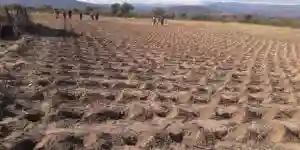Zimbabwe’s Pfumvudza, an agricultural programme, has been criticised by some social media users who view it as the government’s way of proving its incompetence and inability to provide modern technologies to boost production.
Pfumvudza is a concept introduced this year which involves the utilisation of small pieces of land and applying the correct agronomic practices in an endeavour to have higher returns.
The Pfumvudza concept comes at a time when over half of the country is reported to be facing severe starvation due to drought and years of poor agriculture policies. One Helen Mutsvairo posted on Twitter suggesting that the concept was backward. Tweeted Helen:
This Pfumvudza business is proof of how low our standards are. How does digging randomn holes in dry soil ensure food security for the whole country? They hire private jets instead of irrigation equipment & tractors for rural folk. ZANU PF is moving us to the 100yrs back in time.
While some agreed with Helen, another social media user Isaiah Mataruka suggested that the people commenting on Pfumvudza had little information on the programme. Mataruka said:
Not sure if you are familiar with the agri pivot this year. Irrigation is there and #Pfumvudza is for households. Choose what suits your goals. Pfumvudza is to ensure every household harvest enough for consumption!
Zimbabwe has since the turn of the millennium when the fast track land reform programme was implemented, has not been able to produce enough agriculture produce to feed the national, let alone export.
The Southern African country used to be the breadbasket of the Southern African Development Community (SADC) but as some say, has become a basket case.
Zimbabwe is reportedly spending close to a billion United States dollars, annually, to import grain.
Some analysts have urged the government to adopt scientific and modern farming methods which include water harvesting and farming of small grain crops to avert hunger.
More: Helen Mutsvairo

